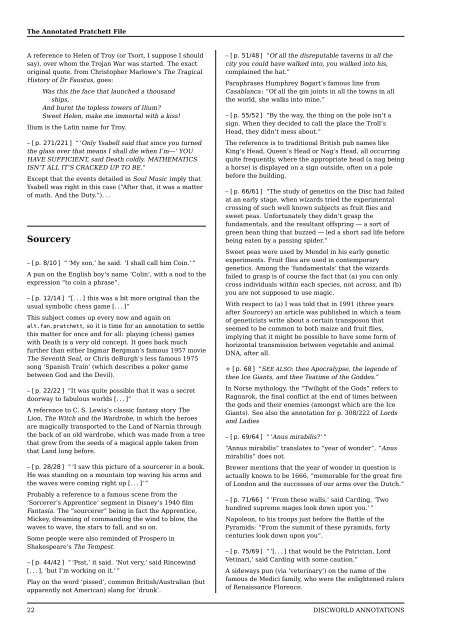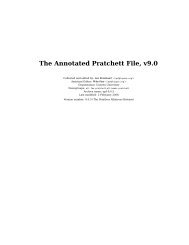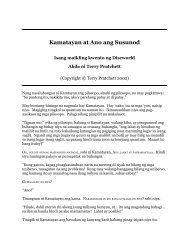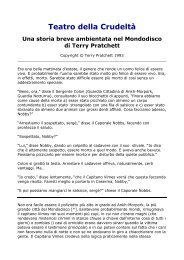The Annotated Pratchett File, v9.0 - The L-Space Web
The Annotated Pratchett File, v9.0 - The L-Space Web
The Annotated Pratchett File, v9.0 - The L-Space Web
Create successful ePaper yourself
Turn your PDF publications into a flip-book with our unique Google optimized e-Paper software.
<strong>The</strong> <strong>Annotated</strong> <strong>Pratchett</strong> <strong>File</strong><br />
A reference to Helen of Troy (or Tsort, I suppose I should<br />
say), over whom the Trojan War was started. <strong>The</strong> exact<br />
original quote, from Christopher Marlowe’s <strong>The</strong> Tragical<br />
History of Dr Faustus, goes:<br />
Was this the face that launched a thousand<br />
ships,<br />
And burnt the topless towers of Ilium<br />
Sweet Helen, make me immortal with a kiss!<br />
Ilium is the Latin name for Troy.<br />
– [ p. 271/221 ] “ ‘Only Ysabell said that since you turned<br />
the glass over that means I shall die when I’m—’ YOU<br />
HAVE SUFFICIENT, said Death coldly. MATHEMATICS<br />
ISN’T ALL IT’S CRACKED UP TO BE.”<br />
Except that the events detailed in Soul Music imply that<br />
Ysabell was right in this case (“After that, it was a matter<br />
of math. And the Duty.”). . .<br />
Sourcery<br />
– [ p. 8/10 ] “ ‘My son,’ he said. ‘I shall call him Coin.’ ”<br />
A pun on the English boy’s name ‘Colin’, with a nod to the<br />
expression “to coin a phrase”.<br />
– [ p. 12/14 ] “[. . . ] this was a bit more original than the<br />
usual symbolic chess game [. . . ]”<br />
This subject comes up every now and again on<br />
alt.fan.pratchett, so it is time for an annotation to settle<br />
this matter for once and for all: playing (chess) games<br />
with Death is a very old concept. It goes back much<br />
further than either Ingmar Bergman’s famous 1957 movie<br />
<strong>The</strong> Seventh Seal, or Chris deBurgh’s less famous 1975<br />
song ‘Spanish Train’ (which describes a poker game<br />
between God and the Devil).<br />
– [ p. 22/22 ] “It was quite possible that it was a secret<br />
doorway to fabulous worlds [. . . ]”<br />
A reference to C. S. Lewis’s classic fantasy story <strong>The</strong><br />
Lion, <strong>The</strong> Witch and the Wardrobe, in which the heroes<br />
are magically transported to the Land of Narnia through<br />
the back of an old wardrobe, which was made from a tree<br />
that grew from the seeds of a magical apple taken from<br />
that Land long before.<br />
– [ p. 28/28 ] “ ‘I saw this picture of a sourcerer in a book.<br />
He was standing on a mountain top waving his arms and<br />
the waves were coming right up [. . . ]’ ”<br />
Probably a reference to a famous scene from the<br />
‘Sorcerer’s Apprentice’ segment in Disney’s 1940 film<br />
Fantasia. <strong>The</strong> “sourcerer” being in fact the Apprentice,<br />
Mickey, dreaming of commanding the wind to blow, the<br />
waves to wave, the stars to fall, and so on.<br />
Some people were also reminded of Prospero in<br />
Shakespeare’s <strong>The</strong> Tempest.<br />
– [ p. 44/42 ] “ ‘Psst,’ it said. ‘Not very,’ said Rincewind<br />
[. . . ], ‘but I’m working on it.’ ”<br />
Play on the word ‘pissed’, common British/Australian (but<br />
apparently not American) slang for ‘drunk’.<br />
– [ p. 51/48 ] “Of all the disreputable taverns in all the<br />
city you could have walked into, you walked into his,<br />
complained the hat.”<br />
Paraphrases Humphrey Bogart’s famous line from<br />
Casablanca: “Of all the gin joints in all the towns in all<br />
the world, she walks into mine.”<br />
– [ p. 55/52 ] “By the way, the thing on the pole isn’t a<br />
sign. When they decided to call the place the Troll’s<br />
Head, they didn’t mess about.”<br />
<strong>The</strong> reference is to traditional British pub names like<br />
King’s Head, Queen’s Head or Nag’s Head, all occurring<br />
quite frequently, where the appropriate head (a nag being<br />
a horse) is displayed on a sign outside, often on a pole<br />
before the building.<br />
– [ p. 66/61 ] “<strong>The</strong> study of genetics on the Disc had failed<br />
at an early stage, when wizards tried the experimental<br />
crossing of such well known subjects as fruit flies and<br />
sweet peas. Unfortunately they didn’t grasp the<br />
fundamentals, and the resultant offspring — a sort of<br />
green bean thing that buzzed — led a short sad life before<br />
being eaten by a passing spider.”<br />
Sweet peas were used by Mendel in his early genetic<br />
experiments. Fruit flies are used in contemporary<br />
genetics. Among the ‘fundamentals’ that the wizards<br />
failed to grasp is of course the fact that (a) you can only<br />
cross individuals within each species, not across, and (b)<br />
you are not supposed to use magic.<br />
With respect to (a) I was told that in 1991 (three years<br />
after Sourcery) an article was published in which a team<br />
of geneticists write about a certain transposon that<br />
seemed to be common to both maize and fruit flies,<br />
implying that it might be possible to have some form of<br />
horizontal transmission between vegetable and animal<br />
DNA, after all.<br />
+ [ p. 68 ] “SEE ALSO: thee Apocralypse, the legende of<br />
thee Ice Giants, and thee Teatime of the Goddes.”<br />
In Norse mythology, the “Twilight of the Gods” refers to<br />
Ragnarok, the final conflict at the end of times between<br />
the gods and their enemies (amongst which are the Ice<br />
Giants). See also the annotation for p. 308/222 of Lords<br />
and Ladies<br />
– [ p. 69/64 ] “ ‘Anus mirabilis’ ”<br />
“Annus mirabilis” translates to “year of wonder”. “Anus<br />
mirabilis” does not.<br />
Brewer mentions that the year of wonder in question is<br />
actually known to be 1666, “memorable for the great fire<br />
of London and the successes of our arms over the Dutch.”<br />
– [ p. 71/66 ] “ ‘From these walls,’ said Carding, ‘Two<br />
hundred supreme mages look down upon you.’ ”<br />
Napoleon, to his troops just before the Battle of the<br />
Pyramids: “From the summit of these pyramids, forty<br />
centuries look down upon you”.<br />
– [ p. 75/69 ] “ ‘[. . . ] that would be the Patrician, Lord<br />
Vetinari,’ said Carding with some caution.”<br />
A sideways pun (via ‘veterinary’) on the name of the<br />
famous de Medici family, who were the enlightened rulers<br />
of Renaissance Florence.<br />
22 DISCWORLD ANNOTATIONS














